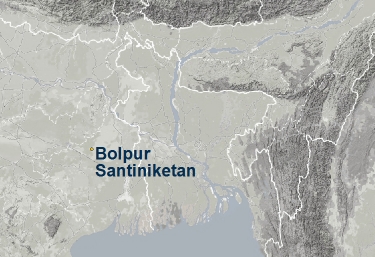Bolpur, Birbhum. 18 November 2009. Gour Khepa
When Gour Khepa succumbed to his fatal injuries from a road accident in a hospital in Kolkata on 27 January 2013, there were many friends and bhaktas (devotees) waiting outside to take him to his samadhi or burial in Kankalitala, not far from his home in Bolpur, Birbhum. There this wild and restless artist would sit now in eternal meditation, under the ground, as is the practice among the Vaishnavas. Pity Gour could not see who all had come to see him for one last time, for he so loved to be at the centre of things; charming, entertaining or disturbing people with his words and wildness.
The veteran Purno Das Baul got out of his car and talked to the Press about the unfairness in this sudden disappearance of a musician so much younger than him; Paban and Mimlu stood waiting for their friend of many decades; Ruchir asked questions about funeral plans for one of his most charismatic heroes of Egaro Mile; Gautam Chattopadhyay’s son and daughter stood by quietly, remembering other untimely deaths perhaps. It seems that Gour had sung a brilliant version of Gautam’s song ‘Telephone’ at the urban baul’s memorial service in 1999.
There was grief in the air at Gour’s ‘transition’, especially in our Baul Fakir Utsav circle. The last festival, our eighth, had happened only two weeks ago to which Gour as Gour had come to conquer, as he always did. Neither Sukanta nor I was in Gour’s close circle; in fact, I found him a bit intimidating. Yet, back home from the hospital that day, all I could think of doing was to listen to his interview which we had taken in 2009, and transcribe it, word for word. More than a year has passed and meanwhile we have had our ninth festival; this time with a huge cut-out of Gour standing in the doorway to the performance tent, for it was hard for his countless admirers to imagine a festival without him. The 2014 festival journal was also dedicated to Gour, there were T-shirts designed with his face. Even those critical of Gour could not ignore him.
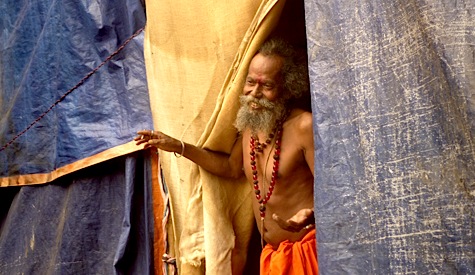
Gour Khepa in front of the tent, Baul Fakir Utsav, 2013
What was so special about Gour? How come this enduring charm? If not charm, at least the ability to draw attention? Was it hype? But even for such hype to build up, there has to be some history.
Gour had talked about his journey through life in his interview with us in the morning of 18 November 2009. He was perfectly sober and seemed to be enjoying this conversation with his devoted pupil Satyaki Banerjee, Sukanta, another friend of ours, Biplab, and me; reminiscing really. Being characteristically caustic and full of himself. Well, what else was Gour supposed to be? That was part of his charm—that he could say whatever he liked, he did not care to be pleasant. মুখের ওপর যে কোনো কথা বলে দিতে গৌরের জুড়ি ছিল না। যেন সবার মুখোশ খুলে দেবার মহান দায়িত্ব দিয়েছিল কেউ ওকে। (এই যে গৌর লিখছি, ‘ওকে’ লিখছি, যেন দাদাটাদা বলা যায় না। আপনি করে সম্বোধন করা যায় না, করলে অদ্ভুত শোনাবে। যেন দূরে থাকলেও আসলে কাছেরই ছিল মানুষটা।) But it was a lot of talking he did that day, serious talking. Towards the end he was getting restless for a drink and music, but by then it was also time for us to leave. He sang a little bit, playing his ektara like a khamak, for the string of his khamak was broken. It takes pure genius to play an ektara like that. I think it was the genius of Gour, which was also behind the making of the enigma that Gour was.
Let’s go backward from the last song.
He turned on his electronic tanpura. Ore amar mon goala,/Roj dubela doodh doabi—a song about the pure essence of life that we must try to draw out bit by bit, like milking the cow. We must also know how to preserve this ‘milk’; cannot let the preying cats and ants with their kuprobritti (badness) destroy it. Poor paraphrasing I know; it is hard with these songs. However, what strikes us is the tanpura, which had become an obsession with Gour. Somehow he had to make this point that he was ‘classical’, he knew his raags, and thus he was musically superior. (Grotowski had said that the purpose of his art in the Theatre of Sources, to which Gour had been invited one year, was ‘first to discover differences, then to discover what was before the differences.’ Perhaps the ‘pre-differentiation art’ Grotowski had found in the baul world was more a thing of his imagination; maybe that is what he needed to see and show to others. In the baul worlds around us, as in any other world of art and artists, there is fragmentation, contestation and differentiation. Could it have been different a long time ago, when ritual was art? How to say?)
Anyway, coming back to the point about classical and folk, Sukanta and I often say that it is strange, also sad, when the finest artists of a genre do not seem to be sufficiently convinced about the greatness of their own art. Why must a baul be classical in order to be special? If everyone cannot be Abdul Karim Khan, then everyone cannot be Gour Khepa, Sanatan Das or Purno Das either. There was no tanpura on the day the eclectic writer and thinker, Deepak Majumdar, had heard Gour in Tarapith, in the mid seventies; he hadn’t yet started to feel the need for one.
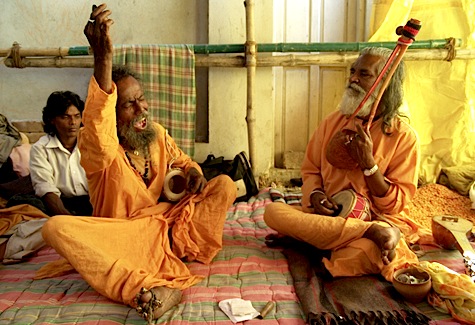
Gour singing with his khamak. Biswanatha Das Baul accompanying with the ektara and dugi.
‘তারাপীঠ মহাশ্মশানে তীব্র উন্মাদ অনুরাগে, নির্দিষ্ট কুম্ভক পাকের মোচড়ে, ঝাঁকড়া-সজাগ মাথাভর্তি চুল চামরের ছন্দে, মেরুদণ্ডের হাতে দুলিয়ে, খমকের সটান-তীক্ষ্ণতায়, দু’পায়ের আকস্মিক বজ্রযানী লাফে, মর্মপ্লাবী দু’চোখের ভাসমানতায়, ঠোঁটের অনাথ-চড়ুই উদ্বেগে, বীরভূমের নাগার্জুন-প্রতিম বাউল গৌরক্ষেপা ঘটিয়ে তুলছিল এমন এক আত্মনিবেদনের জগৎ, এমন এক আত্মবিস্ফোরণেরও ছবি, যার কোন সংজ্ঞা হয় না, কোন তুলনার আলিঙ্গনে যাকে বাঁধা যায় না, চল্লিশ মিনিটের যে ব্রতচারণ মানুষকে ডেকে নেয় এক ভ্রূণাকুল সৌন্দর্য-সাঁতারে।’—দীপক মজুমদার, মাটি-আকাশের দূরন্ত খেলা, কলকাতা: মনচাষা, পৃ ২৩ ।
Again, impossible for me to translate. If Gour knew how to sing, then Deepak knew how to write. But one phrase stands out in this description: কোন তুলনার আলিঙ্গনে যাকে বাঁধা যায় না. . .There was no need to measure yourself against given standards, Gour. You were this amazing performer; people have seen you, they have written about you, they have filmed you. What more can there be to ask for in this one short life, which can end as unexpectedly as it had begun?
There were not many people Gour loved and respected as much as he felt for Deepak Majumdar. Deepak too seems to have felt a deep reverence for him. Writer and musician Mimlu Sen (Baulsphere) said that when Gautam Chattopadhyay and Deepak made Gour their friend, there was an element of hero-worship in it (See Baul Fakir Utsav journal 2014 on Space). Perhaps it was not just that. It was also a matter of mutual admiration between two artists.
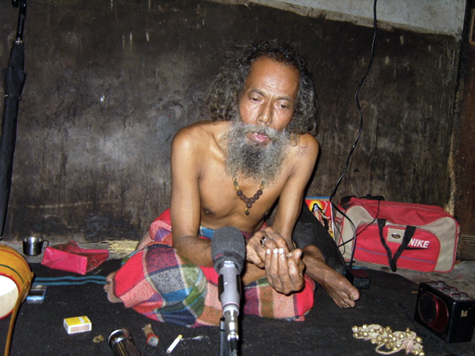
Gour during the interview session
Gour on his birthday and birthplace
This is how our conversation had started on 18 November 2009.
‘Plus minus one month—which means now I am 63. In January I will turn 64’
‘In January? But your birthday is in September. So you will turn 64 in September. From birthday to birthday . . .’
‘How can that be? It has to be calculated by the year.’
Everyone laughs. ‘Agreed, that is also a way to calculate.’
‘This is a different arithmetic. Like Deepak da would say. I took Deepak da to my desh (birthplace). ‘
‘Where is that?’
‘That’s in Labpur thana area. There is a place called Tarulia Lajpur in Labpur thana area. I took Deepak da with me when I went for my passport. When I needed a passport. Deepak da had organised the whole thing for me, he took me.’
‘When you went to Poland? Was that the first time?’
‘Yes, Poland. After Jerzy Grotowski had come to me. So then I said, dada, I don’t know about these things. You have to come to my birthplace. So he went with me and got all the information about my birth from there.’
Childhood and first lessions
Bhaba Pagla
Subal Gosai
Santiniketan
Deepak Majumdar guided Gour through this trip to Poland. Later they had their differences, but Gour was also aware that if there was one person who matched up to him, it might have been Deepak Majumdar. Gour was a frightfully intelligent man. He rattled off names of places and people; analysed events; picked up things from what he saw and heard, which he could later put to use with exceptional capability. Which is probably why he so enjoyed the company of Kolkata’s intellectuals from the start; he liked to see them not so much as his patrons but more as equals. He despised, what he called, the ‘shweeper class’—which was a sweeping generalisation. Anyone could be seen by Gour to belong to such a category; for what they sang, how they lived and what they said. Gour was not one for political correctness. This was probably why students and artists from the city continued to gather around him. They were attracted to his subversion, while—I think (maybe some people will not like me for thinking this way)—he was also quite conscious that his subversion could be attractive.
Bhaskar da and Deepak da
In his conversation with us that day, Gour had talked about visiting London for a month during the Poland trip. He went with Bhaskar Bhattacharya, another important friend of the Bauls. ‘Bhaskar da took me to the BBC, he got me concerts in London, kept me in his house, looked after me. He was a friend of many years.’
‘Tell us then, how were Bhaskar da and Deepak da different? What was different about their methods and attitudes?’
‘Bhaskar da and all—they were into the glamour of making films and would squeeze every bit out of a situation. Deepak da had wisdom. You ask him about any subject, about your PhD, about anthropology, anything to do with texts and learning, Deepakda always knew the answer. Deepak da belonged to a different world all together. English, Bangla—ask him about anything in any language, and he will know the answer. Bhaskar did not have that kind of depth. He was more interested in making films, organising concerts, showcasing artists—he had business in mind. This is how I saw him. Deepak da was not like that. He was not business-minded. He gave away all he had and then died a pauper. He entered the pyre at Keoratola [crematorium] as a pauper; we had to beg to raise money for his treatment. I performed his last rites.
Deepak da was different from others. The only problem was, he didn’t have enough self-knowledge. Knew paratattwa but lacked in atma-tattwa. He could explain things to others, but not to himself.’’
Now of course they are all gone. Gour, Deepak, Bhaskar, Gautam. No one left to feel proud, no one to take offence any more—all mighty talented men. Gour had said of Grotowski, ‘He was so talented. Those with talent don’t live for long. Think of Michael Jackson!’ Gour had said.
Deepak wrote about the Gour-Grotowski connection. ‘জর্জ লুনোর পরিচালনায় ‘দিব্যোন্মাদের গান’ ছবিটি তোলা হল ফরাসি টেলিভিশনের জন্য। অভিনন্দিত হল ইয়োরোপ জুড়ে। সারা পৃথিবীর নাট্যচর্চায় আলোড়ন সৃষ্টি করেছেন যিনি, সেই জের্সি গ্রটাউস্কি এলেন পোল্যান্ড থেকে, মুগ্ধ হলেন গৌরের প্রাণশক্তি দেখে, আমন্ত্রণ জানালেন তাঁর ‘থিয়েটর অফ সোর্সেস’ ওয়ার্কশপে যোগ দিতে। ১৯৮০ র গ্রীষ্মে গৌর পোল্যান্ড গেল। তিন সপ্তাহ পর আমিও পৌঁছলাম। গৌরকে দেখলাম এক অভূতপূর্ব আন্তর্জাতিক স্বীকৃতির সামনে নির্বিকার উত্তেজনায় দাঁড়িয়ে থাকতে।’
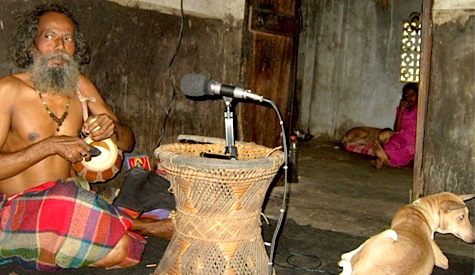
Gour in his house at Nichu Bandhgora, Bolpur
So, this Theatre of Sources to which they went—Naseeruddin Shah and Rekha Sabnis from Bombay, Abani Biswas, Ramkrishna Dhara and Prabir Guha from Calcutta, and Gour and Deepak—they all became friends. Deepak writes that Gour did not like the food—the fact that there was no one to serve. So some days he would end up eating eight to nine eggs. Gour would quote Shankarbaba who said that the act of offering food becomes both an act of giving and receiving. Such as the mother feeds the child in her womb. He was missing that in Poland, Deepak felt. Then when they went on tour with the theatre company ‘Gardzienice’ to villages in eastern Poland around the town of Lublin and when the local people in one village seemed particularly hostile to Deepak and Gour and kept making them drink loads of vodka, Gour offered them songs and laughter. The hard-faced people slowly began to smile. Wlodzimierz Staniewski, the theatre’s director, told them later that the villagers had thought that Gour and Deepak had been sent there by the devil. But Gour had won them over. You offer in order to receive, like the mother, Deepak wrote of Gour.
Grotowski in India
Gour described to us his experience of Grotowski and Poland in his own words. ‘Then Grotowski came [through the Deepak-Chitrabani-Father Gaston Roberge route]. Then he took us to many places across India—Kerala, Bangalore, Andhra, Rajasthan, Gujarat; at the end we came to Joydeb; Ramananda Khepa was there then—‘
‘Was your performance part of a larger performance or did you just do your own things?’
‘No, there was no main play. Each of us did our own thing. I mean, that is how it was here in our country. In Poland it was different. I am coming to that later. What Grotowski did here was, first he selected us; and then he took us to many places, to mountains and forests and placed us in particular settings and asked us to do our own thing while he watched us. He had his special eyes with which he saw, what we were doing, how we looked; such as we look with one eye through the lens before ‘doing’ the camera (ক্যামেরা করার আগে).
‘Then he discussed the plan with us in his [Deepak’s] Naktala flat [in Kolkata]. Said, you won’t get any ganja, there is no ganja in that country. But alcohol, sure; vodka, whiskey, rum as much as you like. Meat, fish, chicken there will be plenty, he said. So he invited me to his country. . .
In Poland
‘Then visa and everything was sorted and we went to Warsaw. They put us up in this building; my forefathers have never been to such a place! It was a huge thing! There were pine trees all around and when the strong wind blew through the pine trees—the storms in Poland! God, my forefathers have never seen such storms! The trees trembled and it felt as if there was an earthquake inside the building. In fact, inside that building I felt that there was always a tremor. And this tall matchbox of a house in a small neighbourhood –the scale of things—I was astounded . . . ‘
‘When was this? Which year?’
‘I don’t remember all that. And anyway, you just listen now to what I am saying. Then the food: everything was so smelly. I don’t know what oil they used for cooking. Poland! Food of the Communist country—no spices, they cook in vinegar, olive oil, who knows what? I began to eat omelettes with butter.
‘Then we went by train to this place, Wroclaw [The name is pronounced something like Vrotswaf, and Gour was quite close. Gour had in fact quite accurately retained the sound of the words; because sound was his source of knowledge. For us who are hovering between our written and sonic sources, the matter of transcription can be very complex: the problem of ‘writing’ sound is a recurring problem in our work. For example, during this transcription, it has been very difficult to find the corresponding written word for the sounds that Gour was giving to us, especially for unknown names and places. ] The train ran at such speed—my forefathers have never seen such trains! It had a pointy nose and sped like a rat; we don’t have such trains in India. It started-hoop! And stopped—goop! They kept us at the theatre, but I was totally constipated. This new place and the severe cold and we had gone from our hot place—I just could not shit.
‘Then they transferred us to Brzezinka-Ostrowina, the forest. There were wild boars in the forest, killer boars—real danger stuff. This was a forest and there were swarms of mosquitoes. They gave us ‘natural’ food and we would have to cook our meals. Got into real trouble because here I had never cooked, Haridasi [Gour’s first wife] would feed me. So I began thinking, god this life of a recluse, how shall I live it for a whole year? Then I needed to shit and went to the toilet and sat down to shit and somehow forced myself; was a real struggle. Then I looked around and there were rolls of paper with blue and yellow flowers, but no water! There was no tap but paper rolls everywhere.
‘There was a –well, they call it river but for us it is only like, you know, just from here to here—however, the water looked clean and nice. So I went –I wasn’t thinking at all—and put my feet and hands and bum in that water. There was to be an interview within an hour. People would come to ask questions. I would have to sing and show all our stuff. Damn! Forget singing and talking, I had to be admitted to a hospital. They fixed all sorts of machines to my hands, I felt numb with pain and it was as if my bottom had come off. My feet had swelled up and seemed to weigh a hundred kilos. I was trembling in my bones. I was in real trouble. So from then, in the daytime, I would use and throw away those rolls of paper in the name of my ancestors, and at night I would wash my bum with hot water and go to bed. What to do? Such was the life of Gour Khepa!
‘Food was also a problem. I found it hard. But the more important thing is that Grotowski loved me very much; he was a good man.’
Theatre of Sources
‘Did you have music programmes in Poland or did you do something with their theatre?’
‘It was—well: imagine a mela. Say, there were ten groups. So they placed the ten groups in ten different places. One Manitoulin, one Whirling, one music, one dotara, one guitar; one African, one Manipuri, one Baul—all happening at the same time. All going on simultaneously. Say, here one, here another, there one, there another, there another . . . like that. So it will happen all together for seven days, then will stop for seven days. At a fixed time every day, around dusk. ‘
‘Here one, there another—does that mean it was on the same stage or was it in some special performance space?’
‘In the forest. That’s where it was happening. Here manitoulin, here whirling–‘
‘What was that? [Manitoulin, we meant]’
‘One man, he would go round and round for three hours [Gour meant the whirling dervishes, I suppose]. Then Manitoulin—they had a piece of wood which they tuned up and produced a particular sound and they danced to that music.’
‘Which country were they from?’ [I think I know now. Probably they were Canadian Aboriginal] ’
‘I don’t know. They came from different places. Jerzy Grotowski had brought everyone. They had made space in the forest for everything to go on at the same time.’
‘So that people would go from one performance to another and see?’
‘Yes, people would go around the whole place. Then there was this guy, Claudoo/Kladu [this is the kind of name Gour was saying and I have no clue what the actual name was], he would drink four or five bottles of the finest vodka [number 1 vodka, Gour said] and vomit into the fire and the flames would rise up high and people would watch. All kinds of strange things he had assembled. He was putting up a show, a theatre. . . . It was not like our stage shows, not like jatra, theatre or our plays.
‘But Grotowski’s theatre, I’ll tell you how it was. Four or five people come into the room and make strange sounds, others respond. They don’t really talk in any language. But make a strange noise, as if they couldn’t talk and so they were talking in gestures.’
‘Did you also take part?’
‘[Laughs] No I just sat and gazed dumbfounded.’
‘So, this was Grotowski’s own composition?’
‘His own. And he was a specialist in alcohol; drank the best vodka all day long. But he was always alert. No one would say he was drunk. And he ate lots of eggs—a hundred, hundred fifty boiled eggs.’
‘Eggs?’
‘Yes, eggs. Eggs, vodka, and then cream and butter [মাখন, সর, চাঁছি। Think he meant cheese].’
‘So he didn’t tell you that this is what you have to sing? You could sing as you liked?’
‘No, not anything we liked. Baul songs. Dehotattwa songs or Radha Krishna tattwa songs. Deepak da guided me. He said, your song should hold the heritage of our land. Don’t sing some rubbish, don’t fool people, just because they don’t understand the language. Because it would all come out at the time of translation and if I sang some rubbish song, then it would be quite disgraceful for us.’
‘Did anyone record you at that time?’
‘No you weren’t allowed to go there with your camera or any other recorder, because you were going as a student. You were going there to see, but also to take lessons. That was the idea. That, here see, this is what you can learn from this country, this from another country. See if you can learn anything. So, someone might see my gabgubi [variable tension chordophone] and then he might keep coming every day; morning and evening. There was no spare instrument, so I could not help much. But he picked up bits of music on his guitar.‘
‘Did anyone learn anything from you?’
‘There was an Italian boy, Stefano. And another Jarek.’
‘They learned to play [the gabgubi]?’
‘No, how would they learn the gabgubi? But they learned some things on the guitar.’
‘Did you play together?’
‘I tuned up his guitar like a dotara and he would strum along. I couldn’t have him play, because that would stop my song.’
Grotowski had assembled artists from different parts of the world for his Theatre of Sources, for his transcultural experiments in Brzezinca and Ostrowina. From the Haitian voodoo artists to the Bauls of Bengal, who were to him both yogis and artists; the Yorubas of Nigeria and the Huichol of Mexico—he made research expeditions to places where ‘archaic’ rites are still alive and selected his artists. The Gour- Grotowski encounter resulted from such an expedition. Grotowski had said that the goal of his exploration was ‘to re-evoke a very ancient form of art where ritual and artistic creation were seamless. Where poetry was song, song was incantation, movement was dance.’ (Interviewed by Sylvia Drake, published in Los Angeles Times 0n 29 September 1983).
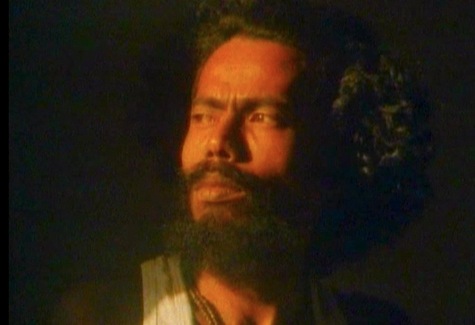
Young Gour, a still from Ruchir Joshi’s film, 11 Miles
I think of Ruchir Joshi’s film, before him Georges Luneau’s, before that Deben Bhattacharya’s recordings, Richard Lannoy’s photographs, or earlier still, Arnold Bake’s footage from Kenduli in the 1930s—they all give glimpses of that world where movement was dance, song was incantation, poetry was song.
In writing ‘was’, we are probably suggesting that that world is no more; it is gone. But, that does not necessarily mean that all is lost. Nothing can be as it was.
On Ruchir’s film, 11 Miles
Ramananda
Gour would not see Ruchir’s film, Egaro Mile, although he was so much in it. He used to say that seeing all those people who were dear to him once but were gone now—Haridasi, Ramananda, Joya Khepa, Deepak da—that would be too painful. But the point is, even if Gour had seen the film, would he not be seeing his own past, a time gone by, a time to which he would never be able to return? In a sense, would he not be encountering his own death? When we look at an album of old photographs, what do we see? Death or life? Life as it was, or life that is no more? About Ruchir’s film, Gour told us: ‘He has said the story in his own way, the way he saw and what he wanted to show. He got some of it. He didn’t get some.’
In other words, Gour was talking about perspectives.
About Paban and going on foreign trips
The storyteller has a perspective; the listener has one too. Mimlu describes the last time they met Gour, a few days before his accident. Mimlu and Paban had got off the train at Bolpur station and there was Gour sitting on the branch of a tree. He was watching the train, waiting for who would come, whom he could capture. In this story, Mimlu is seeing Gour’s dangling feet while Gour is seeing Mimlu and Paban’s heads. And as we listen to the story, we see Mimlu seeing Gour and Gour seeing Mimlu.
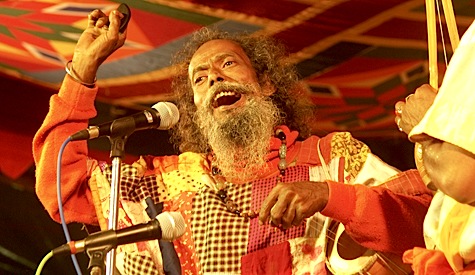
Gour singing at Baul Fakir Festival
As we listen to our interview of Gour today, we know that he is gone. This knowledge pre-conditions us. On that day we went to their house, Durgadasi, Gour’s last khepi (partner/wife), was saying, ‘It is hard enough that I have to hold on to you.’ Gour had replied: ‘Let go of me then, don’t hold me back’. The words gain new meaning now. A simple thing said half in jest, in typical Gouresque manner, sounds slightly prophetic. At the hospital, Durgadasi was singing to herself a wailing song—‘ও তুমি কোথায় গেলে গো, ও আমি কেমন করে থাকব গো, ও তুমি কেন চলে গেলে গো, ও আমায় কেন ফেলে গেলে গো, ও আমি কেমন করে থাকব গো।‘ Where have you gone? How shall I live? It is common to wail in this way in this part of Bengal, Sukanta tells me. As I play the interview over and over to transcribe it, the sound of Durgadasi’s voice entwines with Gour’s. I hear both; voices from the past brought into the future.
Natural and Chemical!
On changing audiences
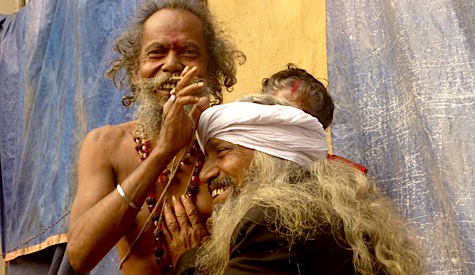
Gour with Tuntun Fakir of Kushtia, Baul Fakir Utsav, 2013
Fakiri gaan
_________________________
Written in May, 2014
Related links:
Grotowski: http://www.grotowski.net/en/encyclopedia/theatre-sources
Paban Das Baul: http://en.wikipedia.org/wiki/Paban_Das_Baul
Gautam Chattopadhyay: http://en.wikipedia.org/wiki/Gautam_Chattopadhyay
gautamchattopadhyay.com
Moheener Ghoraguli: http://en.wikipedia.org/wiki/Moheener_Ghoraguli
http://moheenerghoraguli.hpage.com/
- Saptiguri, North Bengal. 27 November 2003. Nirmala Roy
- Bolpur, Birbhum. 25 November 2003. Nimai Chand Baul
- Kolkata. 4 September 2019. Purnadas on Nabani Das Baul
- Surma News Office, Quaker Street, East London. 27 February 2007. Ahmed Moyez
- Ambikapur, Faridpur, Bangladesh. 29 April 2006. Hajera Bibi
- Sylhet, Bangladesh. 22 April 2006. Chandrabati Roy Barman and Sushoma Das
- Sylhet, Bangladesh. 21 April 2006. Arkum Shah Mazar
- Sylhet, Bangladesh. 20-21 April 2006. Ruhi Thakur and others
- Jahajpur, Purulia. 27 February 2006. Naren Hansda and others
- Faridpur, Bangladesh. 24 January 2006. Binoy Nath
- Uttar Shobharampur, Faridpur, Bangladesh. 22 January 2006. Ibrahim Boyati
- Baotipara, Faridpur, Bangladesh. 21 January 2006. Kusumbala Mondal and others
- Kumar Nodi, Faridpur, Bangladesh. 21 January 2006. Idris Majhi and Sadek Ali
- Debicharan, Rangpur, Bangladesh 18 January 2006 Anurupa Roy & Mini Roy, Shopon Das
- Mahiganj, Rangpur, Bangladesh. 17 January 2006. Biswanath Mahanta & Digen Roy
- Chitarpur, Kotshila, Purulia. 28 November 2005. Musurabala
- Krishnai, Goalpara, Assam. 30 August 2005. Rahima Kolita
- Chandrapur,Cachar. 28 August 2005. Janmashtami
- Silchar, 25 August 2005, Barindra Das
- Kenduli,Birbhum. 14 January 2005. Fulmala Dasi
- Kenduli, Birbhum. 13 January 2005. Ashalata Mandal
- Shaspur, Birbhum. 8 January 2005. Golam Shah and sons Salam and Jamir
- Bhaddi, Purulia. 6 January 2005. Amulya Kumar, Hari Kumar
- Srimangal, Sylhet. 27 December 2004. Tea garden singers
- Sylhet, Bangladesh. 26 December 2004. Abdul Hamid
- Dhaka, Bangladesh. 24 December 2004. Ali Akbar
- Dhaka, Bangladesh. 23 December 2004. Monjila
- Changrabandha, Coochbehar. 16 December 2004. Abhay Roy
- Santiniketan, Birbhum 27 Nov 2004 Debdas Baul, Nandarani
- Tarapith, Birbhum. 14 October 2004. Kanai Das Baul


